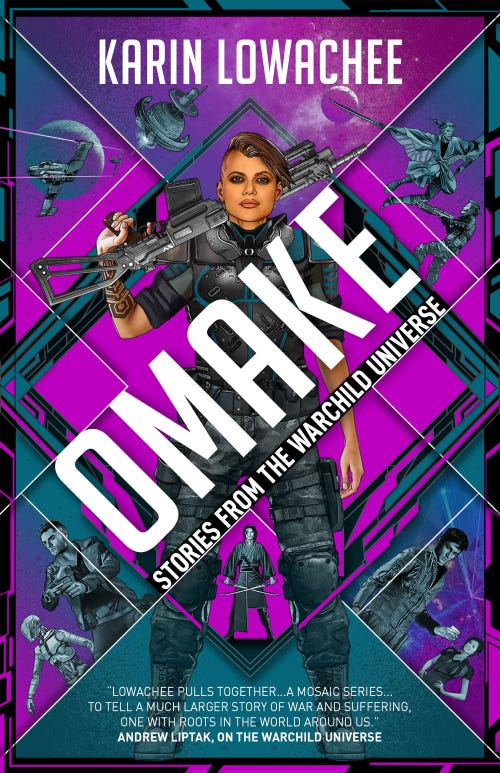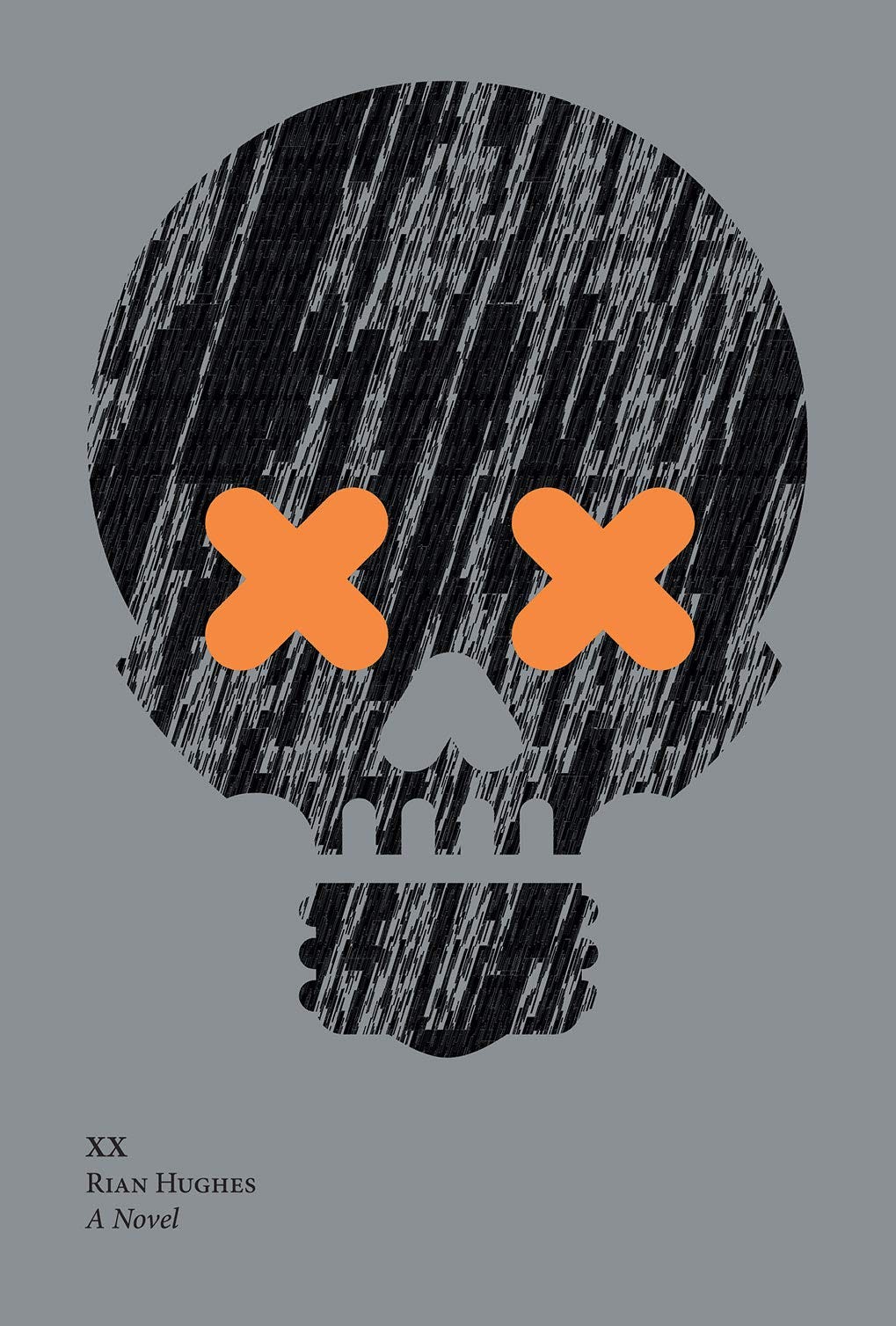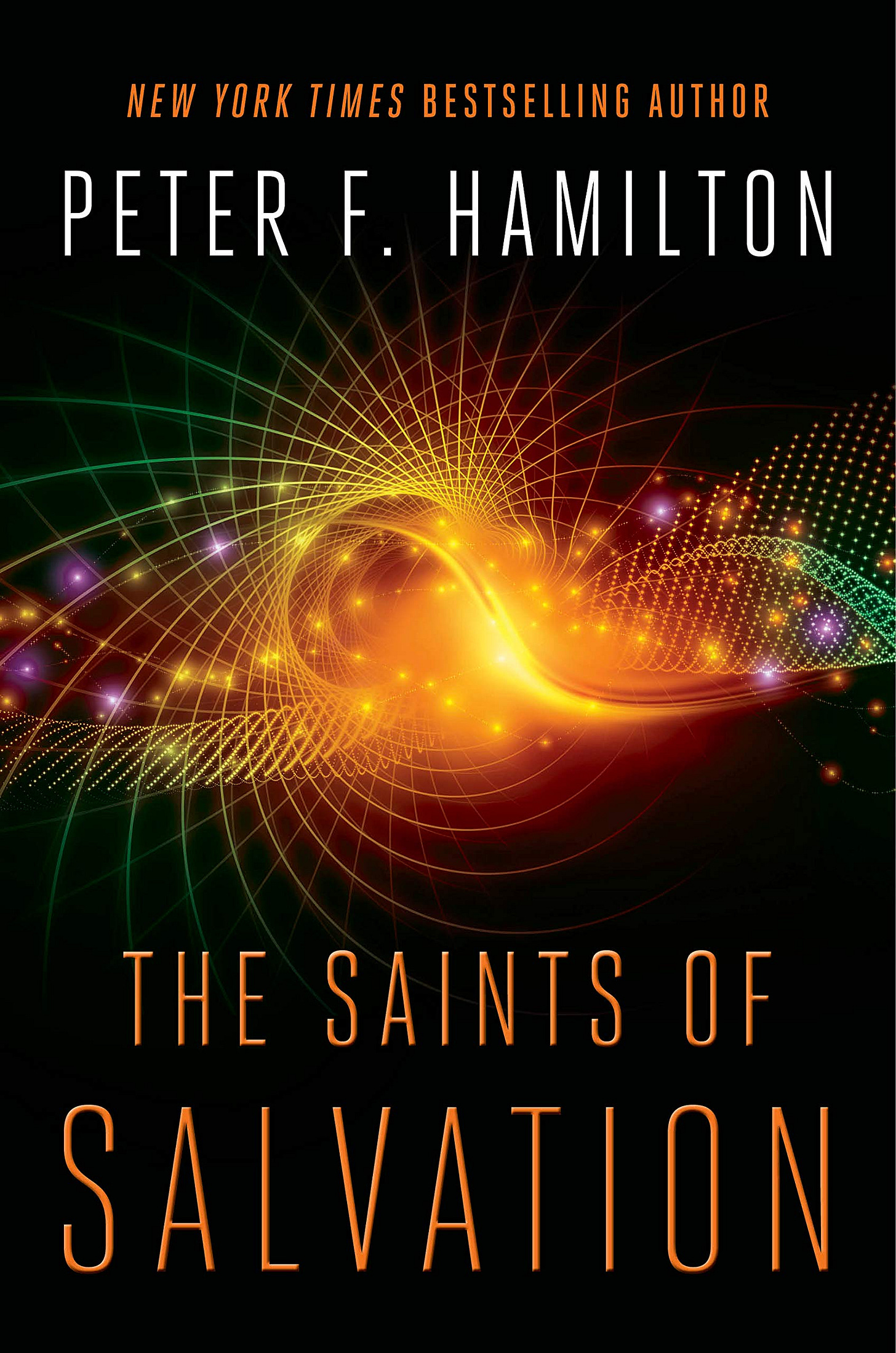17 sci-fi and fantasy books to check out this November

This week is going to be… a week, isn’t it? I cast my ballot for Joe Biden and Kamala Harris a couple of months ago, and I’m dreading the coming controversy that’s sure to come this week as the votes are tabulated.
On top of that, it’s been snowing hard all day, which makes for a nice change of scenery, although it’s supposed to bounce back up into the 60s (what?!) later this week.
I don’t quite know how it’s November already, but it’s a new month, and that means that there are a whole bunch of new books hitting stores this month to check out.
My usual disclaimer: most links here are affiliates, and I might earn a small commission if you click on one.
October 28th

Omake: Stories from the Warchild Universe by Karin Lowachee
This is a bit of a belated October recommendation. Karin Lowachee is one of my favorite (seriously underrated) authors, and her novels Warchild, Burndive, and Cagebird were some formative reads for me.
Lowachee has been working on a number of original short stories set in that world through her Patreon page, and she’s just released them as a collection. It also includes a preview of her upcoming novel, Matryoshka, a fourth installment of that series.
November 3rd
The Best of James Van Pelt by James Van Pelt
I’m not 100% sure of the exact release date here, but Fairwood Press says November 2020. This is a huge collection of short fiction from the prolific James Van Pelt, who’s published extensively since the late 1990s. This looks like a cool overview of his work.
Publishers Weekly gave the volume a starred review, saying that “Van Pelt’s superior combination of imaginative concepts with recognizable human emotions makes him a talent deserving of a wide readership.”
The Best American Science Fiction and Fantasy 2020 edited by John Joseph Adams and Diana Gabaldon
John Joseph Adams and rotating guest editor Diana Gabaldon return this year for the latest installment of the Best American Science Fiction and Fantasy series with a collection of the best short SF/F released in the last year. There’s a solid selection on this year’s list, with stories from Charlie Jane Anders, Elizabeth Bear (twice), Jaymee Goh, Victor LaValle, Ken Liu, Rebecca Roanhorse, E. Lily Yu, and more.
The Fractured Void: A Twilight Imperium Novel by Tim Pratt
Twilight Imperium is a game that I’ve played maybe once or twice with friends in college, but it was always one of those things we spoke about with a level of reverence: it’s a complicated game, one that took a long time to set up and play, but which played out a good story. (This was before the current glut of superb, complicated games now on the marketplace).
Now, we’re getting novels set in the same world. This story follows the captain of a ship and her crew patrolling in a quiet corner of the galaxy, when they respond to a distress call and rescue a scientist who’s engineered a new way to summon wormholes.
The Preserve by Ariel S. Winter
At some point in the future, humanity experiences a wave of devastating plagues, decimating the population. Humans are now vastly outnumbered by advanced robots, who rule the world. Shortly after our new robotic overlords open up dedicated preserves for humanity to rebuild their culture free from robotic influence, someone is murdered in the SoCar Preserve.
Preserve police chief Jesse Laughton now faces a problem as he investigates, realizing that the robots who were opposed to the preserve projects will use the evidence he gathers to show that the experiments were doomed to failure. Kirkus Reviews notes that “Robots may not be so different from humans in this fast-paced futuristic mystery.”
November 10th

XX by Rian Hughes
This ambitious-looking debut tome from Rian Hughes picks up shortly after the Jodrell Bank Discovery Centre picks up a mysterious signal that appears to be from intelligent life, and an AI startup takes on the task of trying to decipher the message, only to find more than they bargained for.
Hughes leans into his experience as a graphic designer for this book: alongside the prose is a mix of found-documents like news reports, emails, pictures, and more, leading to an intriguing volume that blends mediums together to convey its story.
Writing for the Financial Times, Neville Hawcock writes that “There’s no discernible corner of XX’s nearly 1,000 pages that hasn’t been meticulously considered; open it at random and there’s a good chance your attention will be grabbed — by a punk fanzine, a map of an imaginary planet, dialogue in the form of a Victorian music-hall poster, a cityscape constructed out of slashes, exclamation marks and other punctuation, a page of alien print . . .”
Read an excerpt.
The Arrest by Jonathan Lethem
Jonathan Lethem has dabbled with science fiction tropes over the course of his career in books like Gun, With Occasional Music and Chronic City, and in his latest, The Arrest, he explores dystopian and utopian tropes in a seemingly post-apocalyptic event called “The Arrest” in which various technologies around the world stop working.
The book follows Alexander “Sandy” Duplessis, a Hollywood screenwriter, who ends up in Maine helping his sister on a farm. When his college friend and writing partner Peter Todbaum shows up in a fantastical, nuclear-powered machine, they’re not quite sure what to think.
Kirkus Reviews says that Lethem’s “Superminimalist writing, short chapters, interstitial images from the Journeyman’s scrapbook, and Lethem’s unusual perspective make for odd bedfellows, but it’s a decent distraction from the real world right now.
The Factory Witches of Lowell by C. S. Malerich
Growing up in New England (and with family from Lowell, MA), I heard a lot about the mills that popped up along the major rivers in the region throughout the industrial revolution. C.S. Malerich’s new book is set in one of those mills, as the women who have been subjected to intolerable conditions and a rent hike wage a strike against their managers.
As they go on strike, Judith Whittier has seen strikes go bad quickly, and doesn’t want that to happen again. This time, she has some help: witchcraft, thanks to her friend Hannah.
Kirkus Reviews says that it’s “feel-good message of a marginalized community battling amoral, exploitative capitalists might seem a bit obvious, but it also feels empowering during these uncertain times, when so many are still effectively disenfranchised.”
The Rush’s Edge by Ginger Smith
Halvor Cullen was born into military service — literally. He’s a genetically enhanced soldier who was grown in a lab, and while he’s survived combat, his life expectancy is low — now out of the service, he doesn’t expect to live beyond 30, and spends most of his time chasing the adrenaline high that he was designed for. His former CO, Tyce, recruits him into a salvage operation, where Halvor meets and falls for Vivi, a natural-born hacker and tech.
While out on a job, they acquire an alien sphere, and end up fighting against the very military Halvor used to fight for. Publishers Weekly says that “the unlikely bonds linking the crew members and thoughtful exploration of the morality of genetic engineering are sure to draw readers into this well-crafted space opera.”
Nucleation by Kimberly Unger
Helen Vectorovich is an elite deep space pilot flying waldos — remote-controlled robots that explore and work in space thousands of lightyears away, thanks to quantum entanglement. She and her navigator were working on a wormhole that would have connected Earth to a distant system, when everything went wrong.
With her companion dead, her position within the company is now in peril as other operators try and take her prestigious position from her. As she works to figure out what happened, she discovers that the accident might not have been her fault, but that of alien first contact.
Publishers Weekly says that Unger has put together a “smart, plausible vision of the future of space travel, especially the elegant solution of utilizing quantum entanglement to communicate across light years.”
The Fires of Vengeance by Evan Winter
Evan Winter’s self-published debut, The Rage of Dragons (which Orbit then picked up for a traditional release) is set in ancient Africa where one people, the Omehi, have been fighting for years against their neighbors, the Hedeni. The Omehi warriors have a particular ability: they can speak with dragons or transform into powerful, magically-enhanced warriors. One Omehi, Tau, wants to escape from his oppressive life, and seeks revenge after his friends are killed.
In The Fires of Vengeance, Tau’s home is under attack, and he has to join forces with an exiled queen to try and hold off the impending invasion.
Publishers Weekly gave the book a starred review, saying that “Winters capably earns readers’ attention again as he unfurls the politics of a nation in-flux. This forceful second epic will delight fans and newcomers alike—and leave readers holding their breath for the next in the series.”
November 17th

The Saints of Salvation by Peter F. Hamilton
Peter F. Hamilton brings his Salvation Sequence trilogy to a close with The Saints of Salvation, an epic space opera set in the distant future. The trilogy kicked off with Salvation in 2018, set in two timelines: one in 2204 after humanity develops instantaneous travel via a network of gates, and the other in the distant future as a team of specialists are working to try to stop an alien civilization, the Olyix, from a religious crusade to capture all other sentient life in the galaxy and bring it to its “God at the End of Time.”
In this final installment, billions have been captured, but humanity is playing the long game, and the survivors will have to go to extreme lengths to stop the Olyix from carrying out their plans. Publishers Weekly gave this book a starred review, saying that “Hamilton keeps the pages turning with riveting action and intrigue, making the hefty page count fly by.”
Nophek Gloss by Essa Hansen
In this debut novel, a young man named Caiden finds his homeworld destroyed and his entire family wiped out by an alien race known as the Casthens. He survived the apocalypse and ended up on a spaceship operated by a crew of misfit aliens. He’s plotting revenge for the losses, but discovers that the galaxy is a much more dangerous place than he thought and that the Casthen
Publishers Weekly calls the book a “wonderfully inventive debut,” and that “space opera fans will be eager for the next installment.”
The Burning God by R.F. Kuang
Rebecca Kuang brings her Poppy Wars trilogy to an end with The Burning God. In The Poppy War and its followup, The Dragon Republic, a young woman named Rin found herself in the midst of a brutal war between her homeland and a rival, and goes to extreme lengths to turn the tides of battle, only to find that it extracts an excruciating cost.
In The Burning God, Rin has been left for dead, even after saving Nikan from invasion. She returns home, where she finds that the Southern Coalition has been at war with the Dragon Republic and its allies, the Hesperians. Rin realizes that the common people of Nikan are bubbling with discontent, and that she can lead them to overthrow the oppressive regime. I spoke with Kuang earlier this year about the final book, in which she says that “we didn’t pull any punches.”
Library Journal gave the book a starred review, saying that she “doesn’t hold back on the physical and emotional toll of war, along with the cycle of abuse and trauma that can cause good people to make painful choices.”
Read an excerpt.
Speculations of War: Essays on Conflict in Science Fiction, Fantasy and Utopian Literature edited by Annette M. Magid
This book has all the looks of a dense academic text, but it’s one that speaks to me loud and clear: how does speculative fiction interpret conflict? This collection of essays looks to warfare between the Civil War and the present, and looks at how science fiction plays a role in forecasting and imagining how we might fight in the future.
Rhythm of War by Brandon Sanderson
Brandon Sanderson’s long-awaited fourth installment of his epic fantasy Stormlight Archive series is finally here. The series is set in the world of Roshar, which is frequently subjected to intense storms, and where a handful of characters are embroiled in a massive war.
Over the course of the series, an ancient enemy called the Voidbringers have returned to Roshar, and are opposed by Dalinar Kholin and his armies. In this latest installment, he’s fought for years alongside a human coalition against the otherworldly enemies, and right as they unlock a new technological breakthrough, the Voidbringers begin to advance.
You can read a whole bunch of excerpts over on Tor.com.
November 24th
Ready Player Two by Ernest Cline
Ready Player One was a book that really hit the sweet spot when it hit stores back in 2012. A nostalgic look back to the films and TV shows of the 1990s, it was a fun blend of easter eggs and enthusiasm. While Cline’s second book wasn’t … great, I’ll be interested in seeing if he gets back on his game with this one.
From the looks of it, he’s employing the approach of “if it ain’t broke, don’t fix it.” Days after Ready Player One ends, Wade Watts and his friends find another secret hidden in James Halliday’s files, and are sent along on another quest full of easter eggs.
If you’re new to this list, welcome! I always look forward to assembling these roundups, because it helps me find new things to read and helps highlight all the books that I’d love to dig into, but will never have enough time to do so. It is a time-consuming effort, and if you’ve found them useful (here are the lists for June, July, August, September, and October), please consider signing up for a subscription.
Subscribers get some additional, in-depth posts and commentary about the genre and its future. Here are a couple of recent posts that went out to paying subscribers:
- “Qanon for nerds”: Fandom isn’t immune to radicalization
- Where the monsters come out
- Dragonlance changed how we read fantasy
- Dune is migrating to 2021
- Three-Body geopolitics
- Cover Art
That’s all for today. Last week was super busy, so I’m going to take a short break for the next week or so, to catch up on some reading and a couple of other pieces I have due. (I might be back if something newsworthy occurs.)
That said, I’ve got two longer pieces that I’m prioritizing for this month. The first is a look at a US Army effort to come up with a war game that tackles an adversary armed with an artificial intelligence that I took part in. The second is a look at Walden Tapes, an early entry into the audiobooks field, something that I came across earlier this year and have been fascinated by. I’ll have a regular roundup at some point next week as well.
As always, let me know what catches your eye here, and what you’ve been reading lately.
Andrew
PS: If you haven’t already, VOTE!